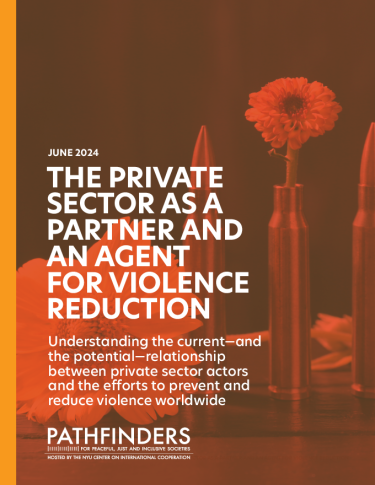The pivotal role of the private sector in society extends beyond economic contributions. It also influences social dynamics and communities’ well-being and cohesion. This report delves into the complex and multifaceted relationship between business entities and local initiatives aimed at preventing and reducing the most serious forms of violence in communities. It presents an analysis of ongoing initiatives, with a focus on exploring the existing interactions and untapped potential of private sector actors in fostering safer environments, which in turn contributes to ongoing global mobilization efforts1 to reduce levels of violence by at least 50 percent by the year 2030.
Historically, the responsibility of maintaining communal peace and security has been primarily shouldered by governmental and public institutions. However, the evolving societal landscape has ushered in a paradigm shift, recognizing the private sector’s important influence and responsibility in this domain. Most businesses, from small enterprises to multinational corporations, inherently seek stable environments for their operations, which then aligns their interests with the broader societal goals of violence prevention and community safety.
This research examines the varied spectrum of private sector entities, delineating their roles and impacts within different local contexts, with a focus on urban areas. It underscores the dual nature of businesses as both beneficiaries of peaceful environments and potential contributors to enhancing the risks of violence in such environments. Through a series of case studies, the report is primarily concerned with showcasing successful collaborations between the private sector and community initiatives aimed at violence reduction, with a focus on those occurring in urban contexts. These examples serve to illustrate how businesses can act as catalysts for positive change, employing their resources, influence, and networks to foster a culture of peace and stability.
Furthermore, the piece proposes a framework for viewing the private sector as a partner with a vested interest in violence reduction efforts and the halving global violence agenda, as well as recommendations for engagement and interventions. In doing so, this report aims to streamline collaboration between businesses, governmental bodies, and civil society, ensuring a unified and comprehensive approach to addressing the root causes of multiple forms of violence and enhancing community resilience.
This report reevaluates the roles of business in society and underlines the need to further invest in examining the private sector impact on violence reduction. It advocates for an integrated approach where the private sector is recognized as a crucial ally in the quest for peace and security, aligning economic objectives with societal needs. By harnessing the private sector’s potential as a partner in violence reduction, the research contributes to the broader discourse on achieving sustainable peace and advancing the United Nations (UN)’s global development agenda—the 2030 Agenda—for a more peaceful, inclusive, and just world.
